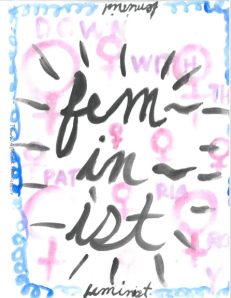
If you’re a feminist and you’re reading this, you’ve probably heard or read something about this whole Rashida Jones business. (If you haven’t, don’t go googling things yet!)
A lot of people have written about it. Besides the article itself and the tweets that started the debate, Jezebel had an especially adamant op/ed, a bunch of tumblr blogs, etc. Both articles, Jezebel and Glamur, articles are linked at the end of this piece. But aside from all that, this is what definitely happened:
Late October, Rashida Jones sent out a series of tweets. These are them, unedited:
“This week’s celeb news takeaway: She who comes closest to showing the actual inside of her vagina is most popular. #stopactinglikewhores
Let me clarify. I don’t shame ANYone for anything they choose to do with their lives or bodies…
BUT I think we ALL need to take a look at what we are accepting as “the norm”…
There is a whole generation of young women watching. Sure, be SEXY but leave something to the imagination.
Also, calling on all men to show me dat ass.”
Then, more recently, Glamour magazine ran an article titled “Rashida Jones on the Pornification of Everything.” She wrote the article herself; it is both a defense of her messages, which could be considered somewhat antifeminist, and an elaboration to persuade. It is hardly an apology. She says in the article, “I’m not gonna lie. The fact that I was accused of “slut-shaming,” being anti-woman, and judging women’s sex lives crushed me. I consider myself a feminist. … But I will look at women with influence—millionaire women who use their “sexiness” to make money—and ask some questions.”
Now my totally subjective opinion: In general, I am disinclined to criticize any pop culture participant who calls themselves a feminist, because I feel like it’s so anomalous already to have someone powerful on our side. And furthermore, I hate to see what is already such a marginalized group become polarized over a single disagreement. That said, sometimes it is necessary to have subjective discussion about a big issue for women today, and what Jones is talking about is a part of that. I just think it’s a shame that she had to use sexist rhetoric, because regardless of what defense comes after it, actually publishing the phrase “#stopactinglikewhores” is going to be offensive to the people who might have agreed with what came after. Jones’s defense of that hashtag was the following:
My hashtag was “stopactinglikewhores.” Key word, acting. Like I said, I’m not criticizing anyone’s real sex life… This isn’t showing female sexuality; this is showing what it looks like when women sell sex.
be I stand by what I said. You have to consider your audience. Whore is a really offensive word, and I could probably write an entire article on why I don’t respect people who use it. But Jones did, and the validity of the point is scarred.
Which is a shame because, like I said, it’s a really valid point. Women are shown portraying a kind of hyperactive sexuality (my term,) one that is undoubtedly incongruent with the actual sexuality of some of the women who sport it. This is awful. But the question is, as it should be for all discussion of feminist issues, whether or not this is actually a sex-based double standard.
In my opinion, it isn’t entirely, but women definitely get the worse end of the stick. I mean, look at any element of the music industry. Men undoubtedly can’t all be interested in pasties and twerking, but so many of them act like they are. Then, there’s women, who, in popular culture, all are representing that sexuality. Not to mention that women are the ones actually performing the sexual acts, and men are off in the corner fully dressed in three-piece suits, enjoying it, or pretending that they are. There is a double standard here, and for this reason, Jones brings up an important point. If we all sit behind the lens of “slut shaming” and convince ourselves that women have a right to twerk and undress and show their “sexuality,” we’re ignoring so many issues within. Sure, she should be able to show off her sexuality, but she should also have the option of the three-piece suits and watching (Janelle Monae is so rad.)
And that’s really what Jones is trying to tell us. I don’t like her article, and I really don’t like her tweets (except for the last one, which is raising the double-standard point,) but I wish that she could just go back in time and get a more sensitive writer to help her get across what she really has to say. The article ignores the last tweet, and simply says that women should wear more clothing, leave more to the imagination, etc. I do not necessarily disagree with this, I actually agree that the societal norm should be women wearing just as much clothes as men. But honestly it seems that Jones says this coming from a different place, wishing this not for equality but because it leaves a bad impression on the young girls watching. I think that’s idiotic, and she never actually explains what’s wrong with young girls thinking they should wear less clothes. …But, she says she’s a feminist, which I appreciate.
Anyway, I do not have a positive or negative polar opinion on Rashida Jones’s feminism. I stand by what I said: She has a valid point and I wish she had never used that hashtag, had elaborated on her last tweet in the series, and furthermore, come at this from an idea of equality.
Iris
Sources:
Glamour article: http://www.glamour.com/entertainment/2013/12/rashida-jones-major-dont-the-pornification-of-everything?currentPage=2
Jezebel criticism: http://groupthink.jezebel.com/thats-not-ok-rashida-and-feminism-vs-whores-1478567788

